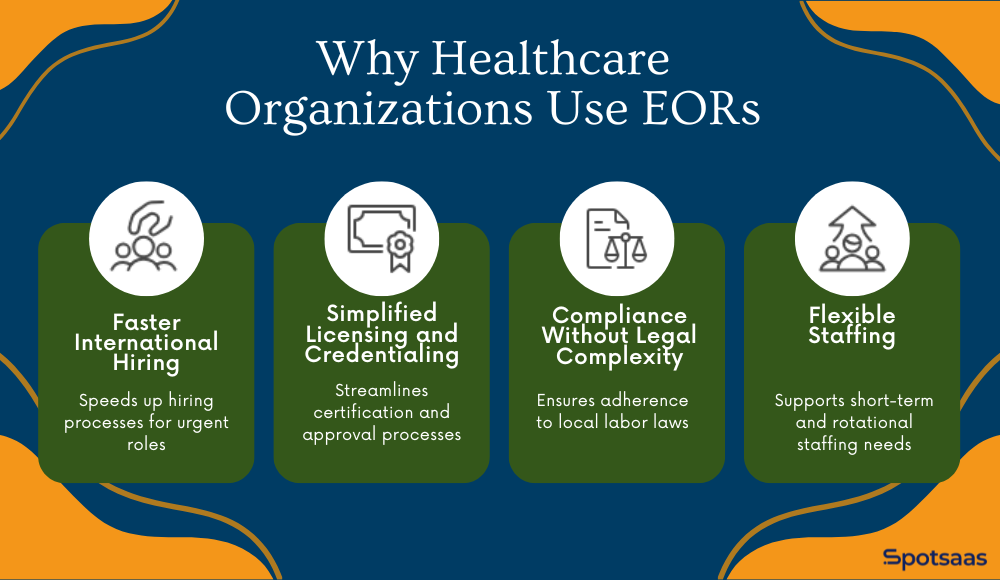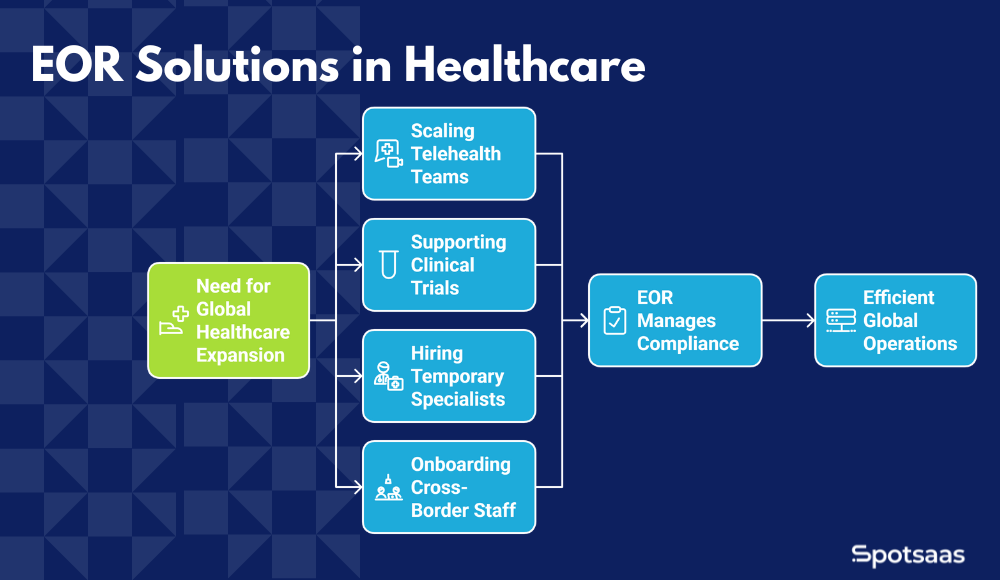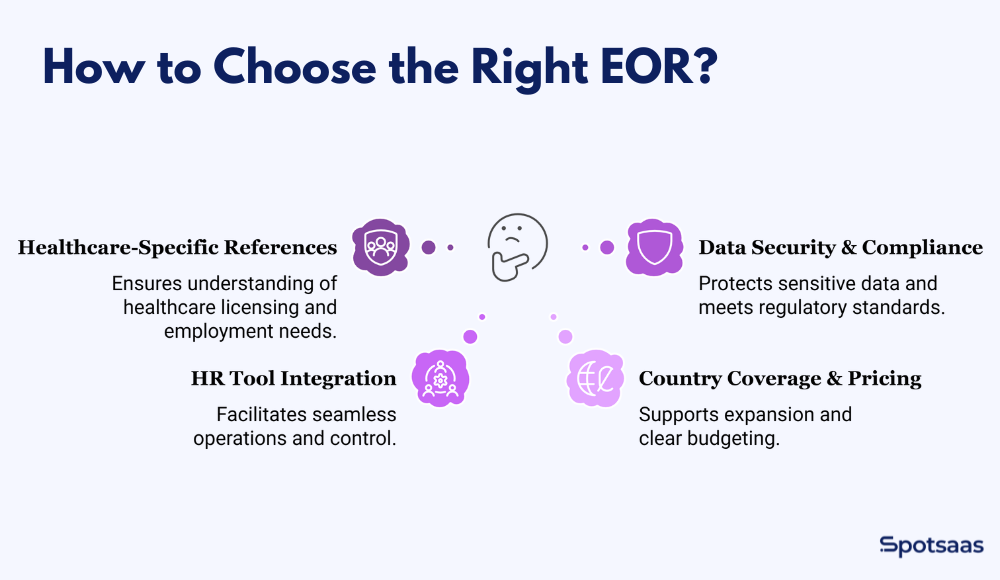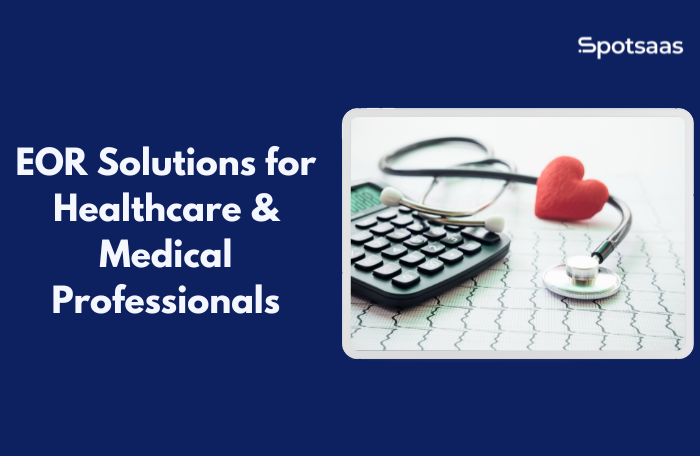EOR solutions in healthcare make it easier for organizations to hire qualified professionals across borders without setting up a legal entity in every country. As global demand for medical staff grows, especially with the rise of telehealth and cross-border care, healthcare providers are exploring faster, compliant ways to expand their teams.
An Employer of Record (EOR) steps in as the legal employer, managing local payroll, taxes, contracts, and labor laws on behalf of the organization. This is especially valuable in healthcare, where licensing requirements and compliance standards can vary widely by region.
With the right EOR partner, healthcare teams can onboard talent quickly while meeting all legal and regulatory obligations in each country in which they operate.
Why Healthcare Organizations Use EORs
Hiring across borders can open up access to top talent, but it also brings operational challenges—especially in a regulated industry like healthcare. EOR solutions help organizations streamline the process while staying compliant.

Faster International Hiring for Urgent and Remote Roles
Whether responding to a public health crisis or expanding telehealth services, healthcare teams often need to hire quickly. EORs speed up international onboarding by handling local employment requirements, allowing organizations to bring on licensed professionals without delay.
This can be especially useful when setting up care teams in underserved regions or working with remote specialists. Instead of waiting months to establish a local entity, teams can start operations in weeks.
Simplified Licensing and Credentialing
Medical roles often require local certifications or government approvals. EOR providers familiar with regional standards can support credentialing, making it easier to place qualified staff in the right markets.
They help coordinate with local authorities and verify licenses so hiring managers can focus on selecting the right candidates without getting stuck in administrative loops. This reduces delays and improves the candidate experience.
Compliance Without Legal Complexity
Every country has its own labor laws, tax rules, and employment documentation. EORs help reduce risk by ensuring contracts, payroll, and benefits meet local legal standards—minimizing the chance of penalties or misclassification.
By outsourcing compliance to experts, healthcare providers can avoid legal bottlenecks and maintain their focus on patient care. This also builds trust with international hires who expect clarity and stability.
Flexible Staffing for Short-Term or Rotational Needs
From travel nurses to temporary specialists, healthcare staffing often involves short-term contracts. EORs support flexible employment models, making it easier to manage rotating teams or trial roles across borders.
This is especially valuable in crisis response or seasonal demand, where agility matters. EORs can manage onboarding, employee offboarding, and documentation with minimal disruption to operations.
Key Features to Look For in a Healthcare-Focused EOR Solution
| Key Feature | Why It Matters |
|---|---|
| Healthcare Compliance Expertise | Ensures alignment with licensing boards, privacy regulations, and industry-specific requirements. |
| Support for Licensing & Credentialing | Helps verify certifications and speed up local approvals for clinical staff. |
| Data Security & Patient Privacy | Protects employee and patient data under HIPAA, GDPR, and regional laws. |
| Payroll & Benefits Management | Delivers on-time, accurate pay with benefits tailored to each location’s standards. |
| Visa & Immigration Support | Assists with relocation processes, paperwork, and compliance for international roles. |
| Flexible Employment Types | Supports full-time, part-time, and contract roles to match staffing needs. |
Not all EOR services are built with healthcare in mind. When evaluating options, it’s important to look for capabilities that meet the specific needs of medical organizations and professionals.
Healthcare Compliance Expertise
Look for EOR providers that understand healthcare regulations in the countries you plan to hire. This includes knowledge of local medical licensing boards, patient privacy laws, and sector-specific compliance requirements.
Having a provider familiar with healthcare standards reduces risk and ensures your team always operates within legal and ethical boundaries.
Support for Medical Licensing and Credentialing
EORs that can assist with validating certifications or coordinating local license approvals bring added value. These services help streamline the hiring of doctors, nurses, and other clinical roles.
It saves time and builds confidence that the talent you’re hiring is qualified and ready to practice in the local market.
Data Security and Patient Privacy Compliance
In healthcare, protecting sensitive information isn’t optional. The right EOR will offer compliance with global data regulations like HIPAA or GDPR, depending on the region.
Ensure the provider has strong security protocols in place, especially when handling personal employee data and any patient-adjacent systems.
Payroll and Benefits Management Across Regions
A good EOR should be able to run an accurate, on-time payroll and offer competitive benefits aligned with local expectations. This includes healthcare coverage, paid leave, and statutory contributions.
A consistent payroll builds trust with your international staff and keeps you aligned with local labor expectations.
Visa and Immigration Support
For roles that require relocation or international assignments, visa support is crucial. An EOR with in-house immigration guidance can speed up the process.
They’ll help manage paperwork, timelines, and ongoing compliance to ensure smooth transitions for your team.
Flexibility for Different Employment Types
Whether you’re hiring full-time staff, contractors, or temporary clinicians, the EOR should support various contract types.
This allows your workforce to scale up or down easily based on patient demand or project timelines—without losing control over legal and HR functions.
Top Use Cases for Healthcare & Medical Employers
EOR solutions are not just for large hospitals—they’re practical for healthcare organizations of all sizes looking to expand across borders, fill urgent roles, or manage remote operations.

Scaling Telehealth Teams Internationally
With virtual care becoming mainstream, many providers are building remote teams across time zones. EORs help onboard licensed practitioners, medical coders, and admin staff without the need to set up local offices.
This enables telehealth startups and established networks to serve global patients while remaining compliant in each region.
Supporting Clinical Trials in Multiple Countries
Medical research teams often hire data analysts, trial coordinators, and clinicians in different countries. An EOR handles contracts, payments, and local labor rules—so trial timelines stay on track.
This setup also ensures participant safety protocols and healthcare regulations are followed in each location.
Onboarding Cross-Border Admin and Support Staff
Beyond clinical roles, healthcare companies also need to hire support teams—IT, billing, HR, and operations. EORs simplify this by managing employment in regions where you don’t have a physical presence.
This allows for a leaner expansion model, with access to talent without the added legal burden.
Benefits and Challenges of EOR Solutions in Healthcare
| Benefits | Challenges |
|---|---|
| Faster hiring in underserved or remote regions | Malpractice insurance may not be included |
| Seamless global payroll management | Licensing approvals can be slow or complex in some countries |
| Reduced legal and HR workload | Communication gaps with EOR teams may occur |
| Full compliance with local labor and employment laws | Limited flexibility for highly specialized or niche medical roles |
| More time to focus on patient care and operations | Some roles may require oversight beyond the EOR’s standard scope |
Benefits of Using EORs in Healthcare
EOR solutions help healthcare organizations expand globally while staying focused on care delivery. Here are some key benefits that make these services valuable.
Faster Hiring in Underserved Regions
Healthcare access gaps can be addressed more quickly when teams are able to hire across borders. EORs reduce the time needed to onboard staff, which is especially helpful in high-demand or underserved areas.
This ensures that facilities remain adequately staffed and can continue offering quality care without delay.
Seamless Global Payroll
Managing payroll across countries can get complicated. EORs centralize the process, ensuring timely payments, tax compliance, and benefit distribution across multiple locations.
This gives both HR teams and international employees peace of mind.
Reduced Legal and HR Overhead
By handling employment contracts, tax filings, and benefits, EORs minimize the administrative load on internal teams.
This allows healthcare providers to scale efficiently without building large in-house HR and legal departments in every region.
Confidence in Local Compliance
Healthcare roles require strict adherence to local labor and licensing regulations. EORs bring that assurance by aligning every hire with the country’s laws.
This reduces compliance risk and helps maintain institutional credibility in new markets.
More Time for Patient Care
With employment operations handled by the EOR, in-house teams can focus on what matters most—delivering care.
Less time spent on paperwork and legal reviews means faster response to community needs and smoother day-to-day operations.
Challenges to Watch For
While EORs offer many advantages, it’s important to be aware of a few potential limitations—especially in a regulated field like healthcare.
Medical Malpractice Coverage May Not Be Included
Most EOR providers manage general employment compliance but may not offer malpractice insurance.
Healthcare organizations should check whether additional coverage is needed for doctors, nurses, or specialists.
Complex Licensing Requirements Vary by Country
Some regions have lengthy or detailed certification processes for medical professionals.
While EORs can assist with paperwork, the actual approval timeline is often controlled by local authorities and may take time.
Communication Between Teams Can Lag
With EOR providers managing operations from another country or time zone, there can be occasional communication slowdowns.
It’s helpful to establish a clear point of contact and agree on response expectations from the beginning.
Niche Roles May Require Direct Oversight
Highly specialized positions may involve unique credentialing or role-specific agreements that EORs aren’t set up to manage.
In such cases, direct hiring or partnering with a healthcare staffing firm might be more appropriate.
Best EOR Providers for Healthcare in 2025
Choosing the right EOR solution can make a major difference in how smoothly your healthcare team scales across borders. Below are three providers known for their experience with medical organizations, licensing compliance, and country-specific employment support.
| Feature | Deel | Remote | Papaya Global |
|---|---|---|---|
| Why It Works for Healthcare | Built-in compliance tools, streamlined hiring for licensed professionals, popular with telehealth & research firms | Flexible hiring for clinical and non-clinical roles, secure data handling, contract customization | Unified dashboard for multiple locations, handles complex staffing like part-time and trial roles |
| Key Features |
– Compliance workflows – Localized benefits – Automated payroll – HIPAA/GDPR support |
– Local benefits planning – Compliant contracts – Multi-currency payroll – In-country employer liability |
– Centralized HR/payroll – Temp staffing support – Advanced analytics – 24/7 multilingual support |
| Pricing | $599/month per employee | $599/month per employee $29/month for contractors |
Approx. $650/month Custom quotes available |
| Country Coverage | 100+ countries | 70+ countries | 160+ countries |
| Trial / Demo | Free demo available | Free demo available | Free consultation and demo |
| Best For | Telehealth startups, remote-first medical teams, fast-scaling healthcare firms | Organizations needing regional benefits and flexible hiring in new markets | Multi-country healthcare operations with mixed contract types |
1. Deel
Why it works for healthcare:
Deel offers built-in compliance tools designed to support the hiring of licensed professionals globally. Its platform simplifies employment contracts, benefits setup, and payroll—all while keeping local healthcare laws in check.
Deel is especially popular with telehealth platforms and research firms managing distributed teams.
Key Features:
- Compliance workflows for licensed professionals
- Localized benefits, including health insurance and paid leave
- Automated payroll and tax filings
- Support for HIPAA/GDPR compliance standards
Pricing:
Starts at $599/month per employee. Contractor management plans start lower.
Coverage:
Available in over 100 countries
Trial/Demo:
Free demo available upon request
Best for:
Fast-scaling telehealth companies, remote-first medical teams, and global healthcare startups
2. Remote
Why it works for healthcare:
Remote work brings flexibility to organizations’ hiring across clinical and non-clinical roles. With a focus on secure employee data management and customizable contracts, it’s a trusted solution for providers working with sensitive medical and operational information.
Key Features:
- Localized healthcare benefits planning
- Fully compliant employment contracts
- Payroll automation with multi-currency support
- Employer liability handled through in-country entities
Pricing:
From $599/month per employee. Contractors from $29/month.
Coverage:
Active in 70+ countries
Trial/Demo:
Free demo available
Best for:
Organizations needing country-specific benefits, such as local insurance plans, and those expanding into new medical markets
3. Papaya Global
Why it works for healthcare:
Papaya is well-suited for healthcare groups with complex international operations. It provides visibility across multiple locations with one unified platform, making it easy to manage rotating staff, part-time roles, and clinical trial teams.
Key Features:
- Centralized platform for HR, payroll, and benefits
- Support for healthcare contract types, including temporary staffing
- In-depth reporting and analytics for workforce management
- Multilingual support and 24/7 helpdesk
Pricing:
Starts at approximately $650/month per employee (custom quotes available for healthcare teams)
Coverage:
Available in 160+ countries
Trial/Demo:
Free consultation and guided product demo
Best for:
Healthcare organizations managing a mix of full-time, part-time, and project-based roles across multiple countries
How to Choose the Right EOR for Your Medical Organization
Choosing an Employer of Record is a strategic decision—especially in healthcare, where employment compliance and patient care are closely linked. Whether you’re hiring telehealth specialists, research staff, or clinical contractors, here’s how to evaluate the right fit for your needs:

Step 1. Look for Healthcare-Specific Client References
An EOR that has worked with hospitals, clinics, or healthcare startups will likely understand the importance of proper licensing, credential verification, and employment classifications.
Ask the provider if they can share case studies or testimonials from healthcare clients. This gives you insight into how they’ve handled region-specific requirements, such as local nursing board approvals or managing contract clinicians.
Why it matters:
Healthcare employment isn’t just about hiring—it’s about patient safety, local legal alignment, and speed to care delivery. Industry experience helps avoid costly missteps.
Step 2. Ask About Data Security and Compliance Standards
Healthcare organizations handle highly sensitive data. The EOR you choose should be equipped to meet strict privacy regulations such as HIPAA, GDPR, and local equivalents.
Ask for details on their data storage protocols, employee access controls, and how they manage compliance audits. A reputable provider will have documentation ready and be transparent about their practices.
Why it matters:
A data breach involving employee or medical data can damage both your reputation and regulatory standing. It’s essential to work with a provider that prioritizes security from day one.
Step 3. Make Sure It Integrates With Your Existing HR Tools
The systems should either integrate with EOR Software to complement your existing platforms—whether you use HR software for shift scheduling, workforce planning, or credential management.
Ask about available APIs, data exports, or dashboard access. Seamless integration reduces friction and gives your internal teams more control and visibility.
Why it matters:
Disconnected systems can slow down hiring, payroll, and compliance workflows—especially when managing multiple hires or rotating teams across regions.
Step 4. Compare Country Coverage and Pricing Transparency
Not all EORs have strong coverage in every country. Make a list of your current and target global hiring locations, and check if the provider has local legal entities there.
Equally important: pricing clarity. The provider should be upfront about monthly costs, onboarding fees, and any added charges for things like visa support or benefits administration.
Why it matters:
Unclear or inconsistent pricing can make budgeting difficult. Country coverage impacts your ability to expand without added legal setup, so it’s critical to match your roadmap with the EOR’s reach.
Conclusion
EOR solutions in healthcare make it possible to hire licensed professionals across borders without the complexity of setting up a local entity. As the demand for global medical talent grows, these services offer a reliable path to staying compliant, managing payroll, and supporting clinical operations in new markets.
Whether you’re expanding a telehealth team, launching international trials, or hiring short-term specialists, the right EOR can simplify the process and reduce operational strain. Focus on providers with healthcare experience, strong compliance support, and transparent pricing.
With the right partner, your organization can scale confidently—without compromising on quality, speed, or legal integrity.
Frequently Asked Questions
What is an EOR in healthcare?
An Employer of Record (EOR) handles hiring, payroll, and compliance for healthcare staff in other countries.
Why do healthcare companies use EOR services?
To hire globally without setting up local entities while staying compliant with labor and medical licensing laws.
Can an EOR help with medical licensing?
Some EORs assist with credential verification and license coordination, depending on the country.
Is using an EOR legally safe for healthcare hiring?
Yes, as long as the EOR has healthcare-specific compliance experience and local legal presence.
Are EORs suitable for small healthcare startups?
Absolutely—they help smaller teams scale globally without legal complexity or upfront infrastructure.





